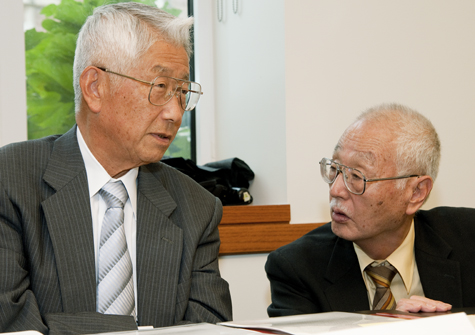
Kevin Lowder
Tokiyasu Fujita (left), former justice on the Supreme Court of Japan, and Hiroshi Itoh, PhD, professor of political science at State University of New York at Plattsburgh, speak during the Washington University in St. Louis School of Law’s two-day symposium “Decision-Making on the Japanese Supreme Court” Sept. 10. The law school’s Center for Empirical Research in the Law hosted the conference, which was organized by David Law, JD, professor of law and of political science in Arts & Sciences, and John O. Haley, JD, the William R. Orthwein Distinguished Professor Emeritus. “The conference embraced every aspect and determinant of the Japanese Supreme Court’s behavior, from the role of precedent and the organization of its law clerk system, to the manner in which Japanese judges are appointed and promoted, to the political environment within which the court operates,” Law says. “The goal was to promote open debate among leading experts on the court and to challenge the conventional scholarly wisdom about how the court behaves and why it does so. We were especially fortunate to enjoy the presence of two former members of the Japanese Supreme Court itself (Fujita and Tokuji Izumi, special councel, TMI Associates). As a result, we were able to learn things about the court that scholars have never known before.”